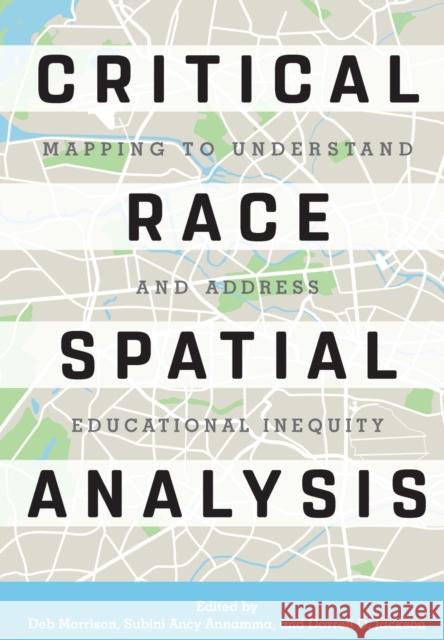Critical Race Spatial Analysis: Mapping to Understand and Address Educational Inequity » książka
Critical Race Spatial Analysis: Mapping to Understand and Address Educational Inequity
ISBN-13: 9781620364246 / Angielski / Miękka / 2017 / 200 str.
Critical Race Spatial Analysis: Mapping to Understand and Address Educational Inequity
ISBN-13: 9781620364246 / Angielski / Miękka / 2017 / 200 str.
(netto: 170,61 VAT: 5%)
Najniższa cena z 30 dni: 164,44
ok. 16-18 dni roboczych.
Darmowa dostawa!
How does space illuminate educational inequity?
Where and how can spatial analysis be used to disrupt educational inequity?
Which tools are most appropriate for the spatial analysis of educational equity?
This book addresses these questions and explores the use of critical spatial analysis to uncover the dimensions of entrenched and systemic racial inequities in educational settings and identify ways to redress them.
The contributors to this book - some of whom are pioneering scholars of critical race spatial analysis theory and methodology - demonstrate the application of the theory and tools applied to specific locales, and in doing so illustrate how this spatial and temporal lens enriches traditional approaches to research.
The opening macro-theoretical chapter lays the foundation for the book, rooting spatial analyses in critical commitments to studying injustice. Among the innovative methodological chapters included in this book is the re-conceptualization of mapping and space beyond the simple exploration of external spaces to considering internal geographies, highlighting how the privileged may differ in socio-spatial thinking from oppressed communities and what may be learned from both perspectives; data representations that allow the construction of varied narratives based on differences in positionality and historicity of perspectives; the application of redlining to the analysis of classroom interactions; the use of historical archives to uncover the process of marginalization; and the application of techniques such as the fotonovela and GIS to identify how spaces are defined and can be reimagined.
The book demonstrates the analytical and communicative power of mapping and its potential for identifying and dismantling racial injustice in education. The editors conclude by drawing connections across sections, and elucidating the tensions and possibilities for future research.
Contributors
Benjamin Blaisdell
Graham S. Garlick
Leigh Anna Hidalgo
Mark C. Hogrebe
Joshua Radinsky
Daniel G. Solorzano
William F. Tate
Veronica N. Velez
Federico R. Waitoller











